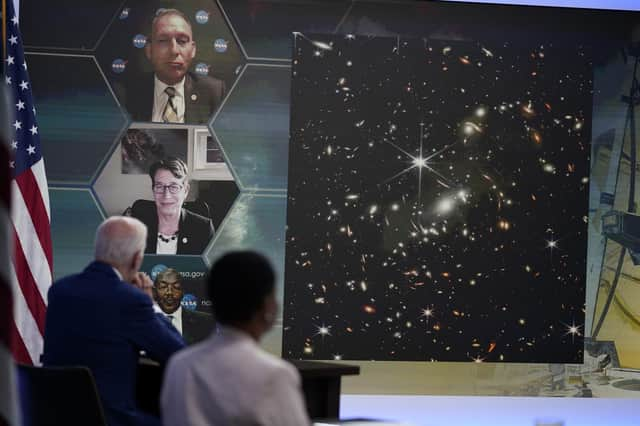RICHARD ORD: Interplanetary Tinder fails to ignite passion. Unmatch and move on ...


We’re told these shots from the James Webb (no, me neither) space telescope promise to reshape our understanding of the dawn of the universe. It’s certainly done that for me. Turns out galaxies from 13bn years ago resemble the opening credits for the Old Grey Whistle Test. All that’s missing from this photograph of swirling celestial bodies is the Test’s groovy outline man booting a star up the backside.
We’ve been spoilt. Modern movie CGI just knocks the real world into a cocked hat. Yes, the Webb-eye view of light from galaxies bending round other galaxies is impressive for being what’s actually out there, but it’s not like the closing credits of Men in Black is it? You know, when those humongous aliens play marbles with different coloured universes.
Advertisement
Hide AdAdvertisement
Hide AdRather than an exhilarating galaxy fly-through featuring pin-sharp star explosions in Super-HD like we come to expect from today's sci-fi movies, we were instead confronted with a static, almost sepia-tinted image of the universe. What no black holes swallowing whole planets? What a swizz.
Professor Brian Cox threw his galactic credits-worth into the mix by telling us this telescope will soon reveal more about WASP-96 b, a giant planet a few light years from home. It may hold the key to revealing whether there is life out there on other planets. If so, it got me thinking, we’d probably end up communicating in much the same way as people do on Tinder.
WASP-96 b, will post a series of photos of itself to give us a taste of what it’s like on the planet. Of course, they’ll only pick the good bits.
In return, we’ll send images of Earth. Filtered to start with. Glorious shots of pyramids, glaciers and whales leaping out of the sea.
Advertisement
Hide AdAdvertisement
Hide AdThat’s kind of how Tinder works. Although the truth can’t be hidden for long. You flick through the photos and then four pix in, you wonder why she’s put a photo of her mother on there. Then it dawns on you. That’s her, only without the filter on!
So it’ll be the same for WASP-96 b as it scrolls through Earth images. Hawaii (ooh), Switzerland (nice), Canada (impressive), Ukraine (what the?)...
Interplanetary Tinder has natural drawbacks. With a distance radius setting in lightyears, a coffee date is pretty much out of the question.
We'll converse for a bit, throw in some lame jokes, and then when we get to the photo of WASP-96 b's leader, all seven-legs of her, it’ll be game over. Unmatch, and move on…